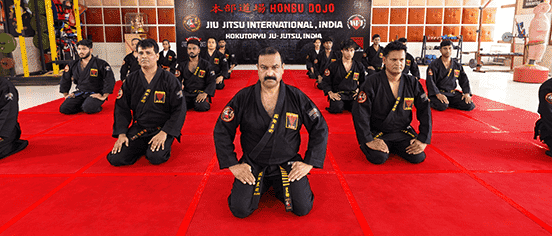
Jiu-Jitsu, a martial art known for its effectiveness, has been referred to by many names such as Jiu-Jitsu, Ju-Jitsu, Jiu-Jitsu, Ju-Jutsu. Some believe it originated in India, while others find its origin in Japan or some find it has originated from a blend of various countries. Despite these differing views, Japan’s role in nurturing and popularising Jiu-Jitsu is widely recognized. This blog explores the origins, development, and current state of Jiu-Jitsu.
Over time, Jiu-Jitsu evolved into various styles,

Martial arts offer numerous advantages beyond self-defence. They improve health, physical fitness, and mental concentration. There are several forms of martial arts. Among these, Jiu-Jitsu is a Japanese martial art. It stands out for its unique approach to martial arts, focusing on submission and ground fighting techniques that emphasise technique over physical strength.
In this blog, we’ll delve into the various benefits of practising Jiu-Jitsu including physical, mental, self defence and more.

Jiu-Jitsu, a martial art known for its effectiveness, has been referred to by many names such as Jiu-Jitsu, Ju-Jitsu, Jiu-Jitsu, Ju-Jutsu. Some believe it originated in India, while others find its origin in Japan or some find it has originated from a blend of various countries. Despite these differing views, Japan’s role in nurturing and popularising Jiu-Jitsu is widely recognized. This blog explores the origins, development, and current state of Jiu-Jitsu.
Over time, Jiu-Jitsu evolved into various styles,

Martial arts offer numerous advantages beyond self-defence. They improve health, physical fitness, and mental concentration. There are several forms of martial arts. Among these, Jiu-Jitsu is a Japanese martial art. It stands out for its unique approach to martial arts, focusing on submission and ground fighting techniques that emphasise technique over physical strength.
In this blog, we’ll delve into the various benefits of practising Jiu-Jitsu including physical, mental, self defence and more.

10th Dan
“The best way to learn a Martial Art is to find the best available instructor and remain loyal to his or her teaching” ~Soke Richard Morris
The late Soke Richard Morris trained and taught martial arts for over 60 years and was one of the most highly regarded martial artists globally. His contribution in modern professional Jiu-Jitsu and across multiple martial arts domains is unparalleled.
Richard Morris, mentored by Professor Alf Morgan, the first Briton trained by Japanese Jiu-Jitsu Master Sensei Yoki Tani, attained his 4th Dan and embarked on researching modern Jiu-Jitsu styles.
He became chairman of the British Jiu-Jitsu Federation and director of the World Jiu-Jitsu Federation until 1986. He founded Jiu-Jitsu International in 1986 to promote a practical Jiu-Jitsu style. Today, Jiu-Jitsu International specializes in professional Japanese Jiu-Jitsu.

10th Dan
Soke Auvo Niiniketo, born in 1954, is the founder of Hokutoryu Jiu Jitsu and the World Federation of Ju-jitsu (WFJ). He began martial arts at eight, primarily focusing on boxing, with 115 matches and representing Finland internationally. He also excelled in karate, winning the Finnish Championship in 1979, and kickboxing, leading Finnish teams in global competitions.
In the 1970s, he started Ju-jutsu in Sweden, evolving it into Hokutoryu Ju-Jutsu, suitable for self-defense, fitness, police, security, and military use. Hokutoryu rules gained popularity in international Ju-jutsu competitions. Soke Auvo founded WFJ, focusing solely on Jiu Jitsu tournaments, following Hokutoryu rules. He travels worldwide sharing his expertise and has been honoured in various countries.

8th Dan
Veerabhadra Dev Anand (b.1962) developed a keen interest in martial arts at the age of 15. He mastered Goju Ryu Karate and achieved a 1st Dan Black Belt in 1982. His interest developed into a passion, and he continued to search for better techniques and explore other forms.
In 1988, he was invited to London by Soke Richard Morris, where he learned Jiu Jitsu and later introduced it to India, founding Jiu Jitsu International, India. Despite his busy schedule as a conglomerate Director, Dev Anand remains committed to mentoring the next generation of martial artists. He regularly visited London for advanced Jiu Jitsu training under Soke Richard Morris until his passing in 2019.

7th Dan, Finland
Shihan Kimmo Tenhunen serves as the Technical Advisor to Indian Hokuto Ryu Jiu Jitsu. He is one of the most highly talented martial artists and holds one of the highest-ranking positions as an instructor, having trained extensively under Soke Auvo Niiniketo. He provides his experienced knowledge and guidance in developing Hokuto Ryu Jiu Jitsu in India, visiting the country on a regular basis to conduct seminars, tournaments, and special training sessions.
As the Vice President of Hokuto Ryu Jiu Jitsu, he travels worldwide to further the development of Hokuto Ryu. He is an official ambassador of Hokuto Ryu and the World Federation of Jiu Jitsu, having already visited more than 50 countries.
Yen Jin Budo Kai is founded by Hanshi Dev Anand to promote Jiu-Jitsu, Ken-Jitsu, Iaido and Battado in India. Yen Jin Budo Kai serves as an umbrella organization of all these martial arts.